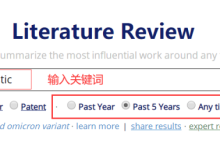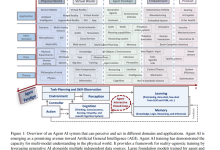分享一篇发表在 arXiv 上的人工智能与医学文献综述:
在当今几乎所有行业中,人工智能都是机器帮助人类的最有效方式之一。自人工智能诞生以来,全球许多研究人员一直在开创人工智能在医学中的应用。虽然人工智能似乎是21世纪的概念,但艾伦·图灵在20世纪40年代率先提出了第一个基础概念。人工智能在医学中有着各种各样的应用,研究人员正在不断探索。计算机和人力资源的巨大增长加速了21世纪的进步,并将在未来许多年继续这样做。这篇文献回顾将突出人工智能在医学中的新兴领域及其当前的发展水平。将综述的文献整理如下表:
|
类别 |
文献 |
|
Cardiopulmonary (心肺) |
Computational repurposing of therapeutic small molecules from cancer to pulmonary hypertension (Negi et al. 2021) |
|
Dynamic detection and reversal of myocardial ischemia using an artificially intelligent bioelectronic medicine (Ganzer et al. 2022) |
|
|
COVID-19 Pandemic (新冠肺炎) |
Artificial Intelligence and COVID-19: deep learning approaches for diagnosis and treatment (Jamshidi et al. 2020) |
|
COVID-19 Artificial Intelligence diagnosis using only cough recordings (Laguarta et al. 2020) |
|
|
Imaging Systems (成像系统) |
Accurate auto-labeling of chest X-ray images based on quantitative similarity to an explainable AI model (Kim et al. 2022a) |
|
A fully automatic AI system for tooth and alveolar bone segmentation from cone-beam CT images (Cui et al. 2022) |
|
|
Deep-learning-based identification, tracking, pose estimation and behaviour classification of interacting primates and mice in complex environments (Marks et al. |
|
|
Oncology (肿瘤学) |
A perception-based nanosensor platform to detect cancer biomarkers (Yaari et al. 2021) |
|
Artificial intelligence for diagnosis and Gleason grading of prostate cancer: the PANDA challenge (Bulten et al. 2022) |
|
|
Brain tumor detection using statistical and machine learning method (Amin et al. 2019) |
|
|
Detection of ovarian cancer via the spectral fingerprinting of quantum-defect-modified carbon nanotubes in serum by machine learning (Kim et al. 2022b) |
|
|
Lung and pancreatic tumor characterization in the deep |
|
|
Machine learning analysis of DNA methylation profiles distinguishes primary lung squamous cell carcinomas from head and neck metastases (Jurmeister et al. 2019) |
|
|
Metabolic detection and systems analyses of pancreatic ductal adenocarcinoma through machine learning, lipidomics, and multi-omics (Wang et al. 2021) |
|
|
Morphological and molecular breast cancer profiling through explainable machine learning (Binder et al. 2021) |
|
|
Predicting and characterizing a cancer dependency map of tumors with deep learning (Chiu et al. 2021) |
|
|
Predictions of cervical cancer identification by photonic method combined with machine learning (Kruczkowski et al. 2022) |
|
|
Toward robust mammography-based models for breast cancer risk (Yala et al. 2021) |
|
|
Tumor-specific cytolytic CD4 T cells mediate immunity against human cancer (Cachot et al. 2021) |
|
|
Pathophysiology (病理生理学) |
A machine learning approach for somatic mutation discovery (Wood et al. 2018) |
|
Fusion of fully integrated analog machine learning classifier with electronic medical records for real-time prediction of sepsis onset (Sadasivuni et al. 2022) |
|
|
The human splicing code reveals new insights into the genetic determinants of disease (Xiong et al. 2015) |
|
|
Pharmaceutical (制药) |
A machine learning approach to define antimalarial drug action from heterogeneous cell-based screens (Ashdown et al. 2020) |
|
Combining generative artificial intelligence and onchip synthesis for de novo drug design (Grisoni et al. 2021) |
|
|
Supervised learning model predicts protein adsorption to carbon nanotubes (Ouassil et al. 2022) |
|
|
Systems biology and machine learning approaches identify drug targets in diabetic nephropathy (Abedi et al. 2021) |
|
|
Therapeutic (治疗) |
Diving beetle–like miniaturized plungers with reversible, rapid biofluid capturing for machine learning–based care of skin disease (Baik et al. 2021) |
DOI: 10.48550/arXiv.2205.00322
点击“阅读原文”了解更多文献信息~
 ai论文润色
ai论文润色







评论前必须登录!
立即登录 注册